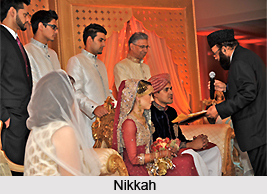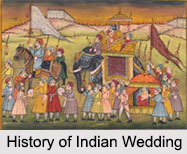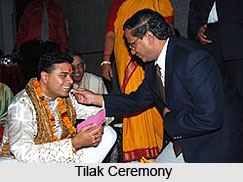 The impact of Islam on Indian weddings has come up from the origin of the Mughal Empire. Indian Muslim marriages are celebrated in an impressive scale owing to their foundation from Mughal rituals. Indian Muslims pay a great respect and significance to their rituals as they have a great impact on their matrimonial lives. Indian Muslims all over their country share the same rituals and customs in marriage as followed by their people in Middle Eastern countries. Indian Muslim wedding rituals are experienced in three days similar to Indian Hindu weddings.
The Ghungat or the veil is a gift of Muslim Rule to India. During Muslim Rule, the humility of any lady was fair game for the Muslim chieftains. The example of Rani Padmani is well known in the country. But there are innumerable unnamed Hindu women, whose modesty was violated during those dark days of the subjective Muslim rule. The Muslim rituals prior to the day of wedding mainly include Mehendi Ceremony, where a mehendiwali will apply mehendi on the feet and hands of the bride. At the same time the womenfolk will sing and dance to bring a festive mood to the wedding atmosphere. The ceremony will be concluded when the bride`s cousins apply a dot of mehendi on the groom`s palm.
The impact of Islam on Indian weddings has come up from the origin of the Mughal Empire. Indian Muslim marriages are celebrated in an impressive scale owing to their foundation from Mughal rituals. Indian Muslims pay a great respect and significance to their rituals as they have a great impact on their matrimonial lives. Indian Muslims all over their country share the same rituals and customs in marriage as followed by their people in Middle Eastern countries. Indian Muslim wedding rituals are experienced in three days similar to Indian Hindu weddings.
The Ghungat or the veil is a gift of Muslim Rule to India. During Muslim Rule, the humility of any lady was fair game for the Muslim chieftains. The example of Rani Padmani is well known in the country. But there are innumerable unnamed Hindu women, whose modesty was violated during those dark days of the subjective Muslim rule. The Muslim rituals prior to the day of wedding mainly include Mehendi Ceremony, where a mehendiwali will apply mehendi on the feet and hands of the bride. At the same time the womenfolk will sing and dance to bring a festive mood to the wedding atmosphere. The ceremony will be concluded when the bride`s cousins apply a dot of mehendi on the groom`s palm.
The impact of Islam on Indian weddings has been widespread nowadays and the wedding rituals are strictly followed. On the day of Muslim wedding or Nikkah, the groom will arrive with his baraati. A band of musicians play some conventional notes to bring a festive mood to the air. The bride`s brother shares a drink of sherbet with the groom as a token of brotherhood and friendship. The bride`s sisters play some pranks and slap the guests playfully with batons made of flowers to check the reception of bride in the groom`s family.
Maulavi or the Muslim priest conducts the marriage ceremony with selected verses from Quran. `Walis` is the father of the bride and of the bridegroom and they will conduct the Ijab-e-Qubul or proposal and acceptance. The boy`s side will propose and the girl`s side for the marriage and will convey her acquiesce. The families will decide Meher on the day of wedding. Meher is the compulsory amount of money given by the groom`s family to the bride.
Prayers and blessings accompany the wedding. The bridegroom, the bride or the Walis, and the Maulvi will sign Nikaahnaama that is a document in which the marriage contract is made. This document gives the right for the groom and bride to divorce each other. The newly-weds arranges for a lavish dinner. Their heads are covered by a dupatta, they read prayers under the direction of the Maulvi The Quran is placed between the couple, and they see each only through mirrors.
At the groom`s house, the groom`s mother holds the Quran above the head of her new daughter-in-law as she enters her new home for the first time. The groom`s family will conduct Valimah or the prolific reception to bring together the two families and their well-wishers. The Islamic weddings in India are one of the most notable rituals followed by the Islamic sects of the nation and their impact is felt strongly.
More on Wedding in Medieval India
More on Indian Wedding Accessories
More on Indian Religious Weddings
More on Types of Marriages
See also
 The impact of Islam on Indian weddings has come up from the origin of the Mughal Empire. Indian Muslim marriages are celebrated in an impressive scale owing to their foundation from Mughal rituals. Indian Muslims pay a great respect and significance to their rituals as they have a great impact on their matrimonial lives. Indian Muslims all over their country share the same rituals and customs in marriage as followed by their people in Middle Eastern countries. Indian Muslim wedding rituals are experienced in three days similar to Indian Hindu weddings.
The Ghungat or the veil is a gift of Muslim Rule to India. During Muslim Rule, the humility of any lady was fair game for the Muslim chieftains. The example of Rani Padmani is well known in the country. But there are innumerable unnamed Hindu women, whose modesty was violated during those dark days of the subjective Muslim rule. The Muslim rituals prior to the day of wedding mainly include Mehendi Ceremony, where a mehendiwali will apply mehendi on the feet and hands of the bride. At the same time the womenfolk will sing and dance to bring a festive mood to the wedding atmosphere. The ceremony will be concluded when the bride`s cousins apply a dot of mehendi on the groom`s palm.
The impact of Islam on Indian weddings has come up from the origin of the Mughal Empire. Indian Muslim marriages are celebrated in an impressive scale owing to their foundation from Mughal rituals. Indian Muslims pay a great respect and significance to their rituals as they have a great impact on their matrimonial lives. Indian Muslims all over their country share the same rituals and customs in marriage as followed by their people in Middle Eastern countries. Indian Muslim wedding rituals are experienced in three days similar to Indian Hindu weddings.
The Ghungat or the veil is a gift of Muslim Rule to India. During Muslim Rule, the humility of any lady was fair game for the Muslim chieftains. The example of Rani Padmani is well known in the country. But there are innumerable unnamed Hindu women, whose modesty was violated during those dark days of the subjective Muslim rule. The Muslim rituals prior to the day of wedding mainly include Mehendi Ceremony, where a mehendiwali will apply mehendi on the feet and hands of the bride. At the same time the womenfolk will sing and dance to bring a festive mood to the wedding atmosphere. The ceremony will be concluded when the bride`s cousins apply a dot of mehendi on the groom`s palm.



















